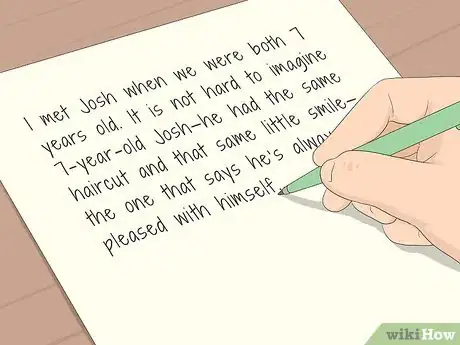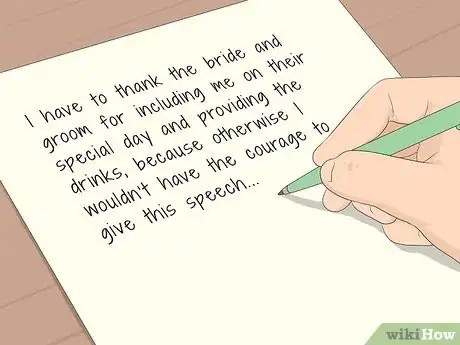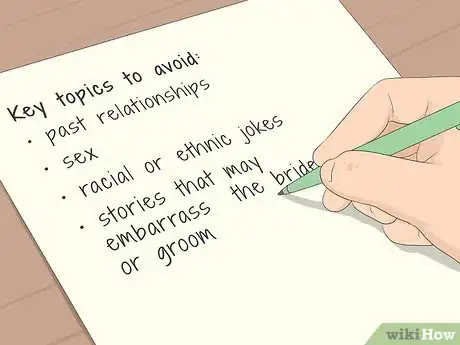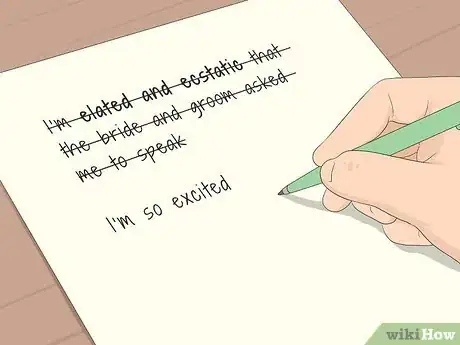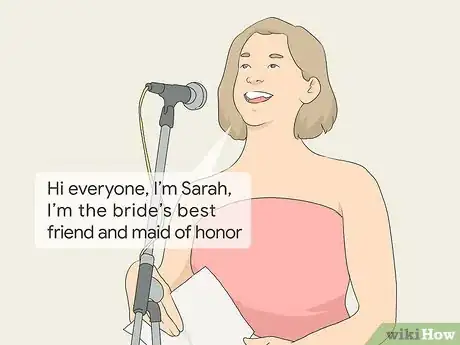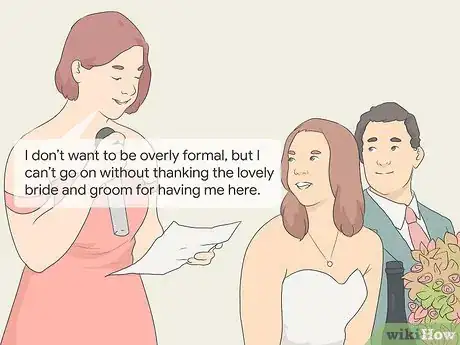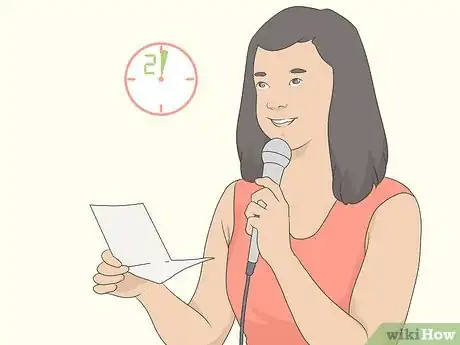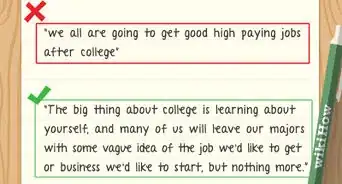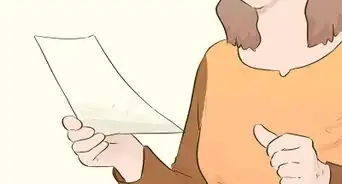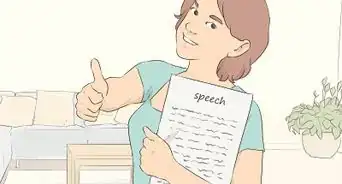This article was co-authored by Lynn Kirkham. Lynn Kirkham is a Professional Public Speaker and Founder of Yes You Can Speak, a San Francisco Bay Area-based public speaking educational business empowering thousands of professionals to take command of whatever stage they've been given - from job interviews, boardroom talks to TEDx and large conference platforms. Lynn was chosen as the official TEDx Berkeley speaker coach for the last four years and has worked with executives at Google, Facebook, Intuit, Genentech, Intel, VMware, and others.
This article has been viewed 9,024 times.
Speeches are a key part of any wedding. Normally, the best man and maid of honor give speeches honoring the bride and groom, but sometimes the couple's parents also give toasts. If you've been asked to give a wedding speech of any kind, it's important to nail the introduction. First, brainstorm to find stories and memories you have with the people getting married. Then start off the speech by introducing yourself and thanking the couple for including you. Recount a few memories, and then set up a good transition into the rest of your speech.
Steps
Brainstorming Ideas
-
1Write your speech ahead of the wedding. Preparation is key to a successful wedding speech. Making sure your intro flows with the rest of the speech takes time, and some rewriting. Spend some time ahead of the wedding with no distractions to compose your speech. Then edit it until it satisfies you. If you start ahead of time, then you can do this without worrying about running out of time.[1]
- The timeline for writing the speech varies from person to person. A few days before the wedding, you may be busy preparing, so plan on thinking about it at least a week in advance. If you’re a slow writer, start planning a month ahead of time.
- Whatever your writing style, never start writing the speech on the day of the wedding.
-
2Brainstorm memories you have with the person you’re toasting. Wedding speeches are all about reflecting on your relationship with your friend and their spouse. The best tip for writing your speech is starting with your memories of the person before you knew their spouse. Reflecting on all your memories gets your creative juices flowing for the rest of the speech. Pick 2 or 3 of those memories to include in the speech.[2]
- Write down multiple stories to have a selection that you could include. You don’t have to use all of them. This just gets your brain working.
- If you’re the maid of honor and the bride is your sister, for instance, memories could include how you two bickered when you were younger, when you finally started getting along, or a time that you helped each other out.
- Wedding speeches commonly include the story of how you met the person, a funny or profound experience you had when you were younger, and how you met the person’s spouse. Plan on including your meeting story in the intro.
Advertisement -
3Plan lighthearted jokes to keep everyone entertained. While you shouldn't approach the speech like a stand-up routine, starting off with a few jokes is a great way to keep the mood light and fun. Brainstorm a few good joke ideas that will get the audience to chuckle. Remember to keep all your humor clean and lighthearted. Don't make fun of anyone or tell insensitive jokes. Pick one of your favorite jokes for your introduction to start the speech off with a laugh.[3]
- A harmless joke for your introduction could be, “I have to thank the bride and groom for including me on their special day and providing the drinks, because otherwise I wouldn’t have the courage to give this speech.”
- Try to avoid inside jokes as well, because most other people won’t understand them. 1 or 2 inside jokes are okay, but get rid of any more so the whole reception is in on the joke.
- If you do use some inside jokes, try to explain them briefly so the audience can laugh along. For example, “So I’m here to toast Skinny now. Do you all know why I call the groom Skinny? It’s because back in high school our football coach threatened to bench him because he didn’t go to the gym enough.”
-
4Match the humor to your personality. While trying to come up with jokes, remember that this speech is personal to you. Don’t do what you think you're supposed to do. Use humor, phrases, and inflections that you would normally. This makes your speech much more genuine and relatable.[4]
- If you’re a best man, for example, common advice is to tell lots of jokes about the groom. But if you’re a stern person who doesn’t tell jokes, then forcing some out won’t look genuine. Opt for a few wholesome jokes rather than frat boy-style jokes to stay consistent with your character.
- Similarly, if you’re naturally a laid-back person, don’t try to be extra serious. Put your personality into your speech.
-
5Test out your jokes ahead of time so you know if they’re appropriate. Remember that there are a lot of people at weddings, and not all of them share your sense of humor. Get a few other people’s opinions on your jokes before the wedding day so you know if anything is inappropriate. If someone tells you a joke is offensive in any way, eliminate it. You don’t want to risk upsetting someone at the wedding.[5]
- Try to reach outside your immediate friend group for opinions. Your close friends may share your sense of humor, so you might not get a good indication whether certain jokes are appropriate from them.
-
6Avoid any offensive or inappropriate content. There are some topics that are just off-limits for wedding speeches. While light humor is expected, never try to embarrass or offend the bride and groom. If you have any doubts whether a joke or comment is appropriate, play it safe and get rid of it.[6]
- Key topics to avoid are past relationships, sex, racial or ethnic jokes, or stories that you know embarrass the bride or groom.
- Avoid any topics that might be a secret. For example, the groom might not know that you took an impromptu vacation with the bride while he was away on a business trip once.
- A good general rule is avoiding jokes about the spouse. If you’re the best man, don’t tell any jokes about the bride, and vice versa if you’re the maid of honor. Even if you have a good relationship with the person, you don’t want it to look like you’re making fun of them.
-
7Eliminate any words or phrases that are hard to say. While composing your speech, keep in mind that you have to say these words out loud. Some things sound good on paper, but are difficult to say. Continually read your speech back to yourself aloud to see if it flows well. If any parts trip you up, revise them.[7]
- For example, “I’m elated and ecstatic that the bride and groom asked me to speak” might look good, but saying 2 vowels that quickly is like a tongue twister. Instead, saying “I’m so excited” is much easier.
- Also keep in mind if you always trip over a certain word or phrase. If you’re practicing and keep getting tripped up at a certain spot, it’s easier to just eliminate the word that’s giving you trouble.
Composing the Introduction
-
1Introduce yourself to the reception. It’s unlikely you’ll know everyone at the wedding, so always start off with a brief introduction. Say your name and who you’re at the wedding with. This connects you with members of the reception who you haven’t met yet.[8]
- You don’t need a punchy introduction. A simple, “Hi everyone, I’m Sarah, I’m the bride’s best friend and maid of honor,” is fine.
- Try to use a little bit of humor in your introduction, if possible. For example, “Hi everyone, I’m Mike, the best man, and someone decided it was a good idea for me to give a speech tonight.”
-
2Thank the bride and groom for including you. This is somewhat formal, but an expected part of all wedding speeches. Don’t move on until you’ve thanked the bride and groom for putting the wedding together and giving you a part in it.[9]
- You can still use a bit of lighthearted humor at this part. For example, “I don’t want to be overly formal, but I can’t go on without thanking the lovely bride and groom for having me here.”
- For added points, also thank the guests for coming and making the event possible.
-
3Recount when you first met the person you’re at the wedding with. This part is unique to you and your relationship to the person getting married. Start the speech off with a moving or funny story about meeting the person you’re there with. This establishes the bond between you two and lets the guests see the depth of your relationship.[10]
- Try to make this a natural part of the speech rather than introducing it out of nowhere. While, “I first met the bride in our freshman year of high school” accomplishes the task, something else like, “Ten years ago I never thought I’d be standing here, because the bride and I hated each other when we met in math class as freshmen” uses a more narrative style.
- If you’ve known the bride or groom your whole life, like if you’re a sibling, then think about your first memory of them. For example, “My first memory of my brother is when he poured spaghetti on my head at the dinner table.”
-
4Transition into the story you’re going to share. Most wedding speeches center around a main story in the center of the speech. Usually, this includes your friend or family member meeting their spouse, and how you knew this was the right person for them. Make sure the introduction sets this story up with a consistent theme or tone. Transition into the story with a good sentence that flows into it. The particular story will depend on your relationship with the person.[11]
- A good transition is spending the introduction talking about how you met the groom in college and thought he’d never get married. Then, your transition could be how when he met his wife, suddenly he started talking about settling down and having a family. The rest of the speech should cover this arc and how he changed for the better.
- This tactic will also work in stories that don’t involve a lot of change. For example, “As you can see, John always knew what he wanted in life. That’s how I knew Kristin was perfect for him,” is another good transition.
-
5Wrap up the introduction in 2-3 minutes. You still have the rest of the speech to give, so don’t ramble in the introduction. Give your thanks, make a few jokes, tell a quick story, then move on with it. Time your intro so you know it finishes up within about 3 minutes.[12]
- Adjust your approach depending on the situation. If you’re the only one speaking, then a speech near 10 minutes is okay, so you have more time for your intro. If there are multiple speakers, try to finish your speech within 5 minutes. That means your intro should be 2 minutes at most.
- When timing your speech, remember to speak at the pace you’ll be speaking at the wedding.
-
6Write the rest of the speech. Now that you’ve nailed the intro, get on with the rest of the speech! Remember the themes and stories you set up, and make your speech consistent. Keep the jokes lighthearted and appropriate, congratulate the couple, and toast the bride and groom.[13]
- Remember that after you write the rest of the speech, go back to the intro and see how it flows. Make revisions to the intro if you have to so it matches the rest.
- If you get stuck on the intro, then move on to the rest of the speech. Sometimes writing the intro last works out better, and some people prefer doing it this way.
Expert Q&A
-
QuestionShould I introduce myself at the beginning of a wedding speech?
 Lynn KirkhamLynn Kirkham is a Professional Public Speaker and Founder of Yes You Can Speak, a San Francisco Bay Area-based public speaking educational business empowering thousands of professionals to take command of whatever stage they've been given - from job interviews, boardroom talks to TEDx and large conference platforms. Lynn was chosen as the official TEDx Berkeley speaker coach for the last four years and has worked with executives at Google, Facebook, Intuit, Genentech, Intel, VMware, and others.
Lynn KirkhamLynn Kirkham is a Professional Public Speaker and Founder of Yes You Can Speak, a San Francisco Bay Area-based public speaking educational business empowering thousands of professionals to take command of whatever stage they've been given - from job interviews, boardroom talks to TEDx and large conference platforms. Lynn was chosen as the official TEDx Berkeley speaker coach for the last four years and has worked with executives at Google, Facebook, Intuit, Genentech, Intel, VMware, and others.
Public Speaking Coach You can mention it briefly, but the odds are high that you'll be introduced by the DJ or emcee. However, it is a good idea to walk around and introduce yourself to as many people as possible before the speech. This way, people you don't know will have a personal connection with you when you get up to speak.
You can mention it briefly, but the odds are high that you'll be introduced by the DJ or emcee. However, it is a good idea to walk around and introduce yourself to as many people as possible before the speech. This way, people you don't know will have a personal connection with you when you get up to speak.
References
- ↑ Lynn Kirkham. Public Speaking Coach. Expert Interview. 20 November 2019.
- ↑ https://www.vox.com/the-goods/2019/10/11/20908156/wedding-speech-writer-professional-best-man-maid-honor
- ↑ https://www.askmen.com/money/how_to/best-man-speech.html
- ↑ https://www.vox.com/the-goods/2019/10/11/20908156/wedding-speech-writer-professional-best-man-maid-honor
- ↑ https://www.weddingideasmag.com/14-wedding-speech-tips/
- ↑ Lynn Kirkham. Public Speaking Coach. Expert Interview. 20 November 2019.
- ↑ https://www.vox.com/the-goods/2019/10/11/20908156/wedding-speech-writer-professional-best-man-maid-honor
- ↑ https://www.artofmanliness.com/articles/how-to-write-deliver-good-best-man-speech/
- ↑ https://www.presentationmagazine.com/the-structure-and-etiquette-of-wedding-speeches-1041.htm
- ↑ https://www.presentationmagazine.com/the-structure-and-etiquette-of-wedding-speeches-1041.htm
- ↑ https://www.artofmanliness.com/articles/how-to-write-deliver-good-best-man-speech/
- ↑ https://www.artofmanliness.com/articles/how-to-write-deliver-good-best-man-speech/
- ↑ https://www.presentationmagazine.com/the-structure-and-etiquette-of-wedding-speeches-1041.htm


